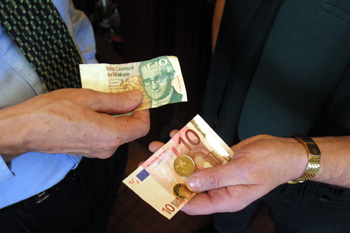Prepare for the return of the punt

The eurozone is likely to shrink to a Germanic core with peripheral countries such as Ireland being ejected and reverting to national currencies, predicts Dan White
18 November 2011
After bubbling under the surface for more than two years the euro debt crisis finally erupted in early November. The trigger was the 26 October agreement between EU leaders, the latest attempt to “solve” the euro debt crisis. Unlike its many predecessors which managed to calm the markets for weeks or even months, the 26 October agreement unravelled within days.
The G20 Summit at the French Mediterranean resort of Cannes on November 3rd and 4th also failed to produce any credible solution. The following week Italian Prime Minister Silvio Berlusconi and his Greek counterpart George Papandreou were forced to announce their resignations, the latest political casualties of the euro debt crisis.
Spike in bond yields
Even more serious was the dramatic spike in Italian bond yields, which soared to a euro-era high of almost 7.5% in the immediate aftermath of Berlusconi’s resignation announcement. With its €1.9 trillion debt being the equivalent of 120% of GDP and with over €300bn of debt needing to be refinanced in 2012, there is no way that Italy can endure yields at these levels for more than a few weeks.
Under normal circumstances the national central bank steps in when a country’s bonds come under pressure on the markets. It will print as much money as is required and buy all the bonds being sold by investors. This is essentially what the US and the UK have been doing for the past three years.
In addition the national central bank will act as lender of last resort to its banks, once again printing money, and lending stressed banks the cash they require to repay nervous depositors and bondholders.
So why isn’t the ECB doing what “normal” central banks such as the Federal Reserve and the Bank of England have done? But of course the ECB isn’t a normal central bank, far from it.

Italian prime minister Silvio Berlusconi was forced to announce his resignation due to the euro debt crisis

Italian prime minister Silvio Berlusconi was forced to announce his resignation due to the euro debt crisis
Bundesbank model
The Germans only agreed to the creation of a single currency on condition that the ECB was closely modelled on the German central bank, the Bundesbank. As such it inherited the Bundesbank’s deep-rooted inflation-phobia. It also inherited the Bundesbank’s mandate, which is focussed exclusively on price stability, with an annual inflation target of 2%. This is in stark contrast to the Fed, whose mandate also stresses the requirement to maximise employment.
Unfortunately the ECB’s overly-restrictive mandate is the least of its problems. As well as insisting that the ECB be a Bundesbank clone, the Germans insisted on inserting a “no bailout” clause into the 1992 Maastricht Treaty that paved the way for the establishment of the single currency. This has made it extremely difficult for the ECB to either buy the bonds of eurozone member countries or to act as a lender of last resort.
Fundamental problems
While the flaws in the institutional architecture of the eurozone are well-known there is an even more fundamental but less well-understood problem. When the Federal Reserve or the Bank of England lend money to their national treasuries, which is effectively what buying government bonds amounts to, they can expect to get their money back. Unfortunately the euro is virtually unique in being a currency without a country. This means that it has no national treasury but instead 17 competing national treasuries.
While the ECB would probably feel fairly relaxed about buying German government bonds, with Greek bonds set to be written down by at least 50% it is looking at a major “haircut”. Will it suffer even bigger losses when it is forced to write down the Italian and Spanish bonds it has bought since last summer to their true market value?
And what about the near €150bn which the ECB and the Irish Central Bank, effectively its local subsidiary, have lent the Irish banks as nervous depositors and bondholders have taken their money elsewhere? No-one outside of the ECB seriously expects that this money will be repaid in full.
Germany picks up the tab
In truth it is this fear of not getting its money back rather than any deep-seated philosophical or ideological objections that probably lies at the heart of the ECB’s reluctance to act as lender of last resort. Germany, which would end up picking up most of the tab for any ECB losses, is equally strongly opposed to the ECB acting as lender of last resort for the very same reason.
So what is the most likely solution to the euro crisis if the ECB is either unwilling or unable to act as lender of last resort?
Until former Greek Prime Minister George Papandreou had the temerity to suggest holding a referendum on his country’s EU/IMF bailout, EU and ECB spokespersons never tired of pointing out that there was no way of leaving the euro because the founding treaties made no provision for such an occurrence.
Always a way
This was nonsense. There is always a way. We humans are an inventive species. Needs makes must. If something has to happen then as sure as night follows day a way will be found to make it happen.
With France and Germany ordering Papandreou that any Greek referendum should be straight yes-no on that country’s membership of the eurozone and rumours sweeping the market that the eurozone’s two largest economies were preparing the ground for a smaller single currency bloc, the previous taboo against even contemplating a partial break-up of the eurozone has been well and truly smashed.
Now that the cat is out of the bag events are likely to move quickly. By far the most likely outcome is that the eurozone will shed most of its peripheral members and shrink to a hard, Germanic core. Basically a D-mark Mark II.
Is Ireland out?
And where does that leave Ireland? Will we be one of the “ins” or the “outs”? Almost certainly one of the latter. With an effective debt/GNP ratio, when the various costs associated with bailing out the banks are added, close to 300% and the domestic economy flat on its back Ireland urgently needs both a debt write-down and a currency devaluation, neither of which are possible while we remain in the eurozone.
Prepare for the return of the punt, and sooner rather than later.



 Print
Print






Fans 0
Followers